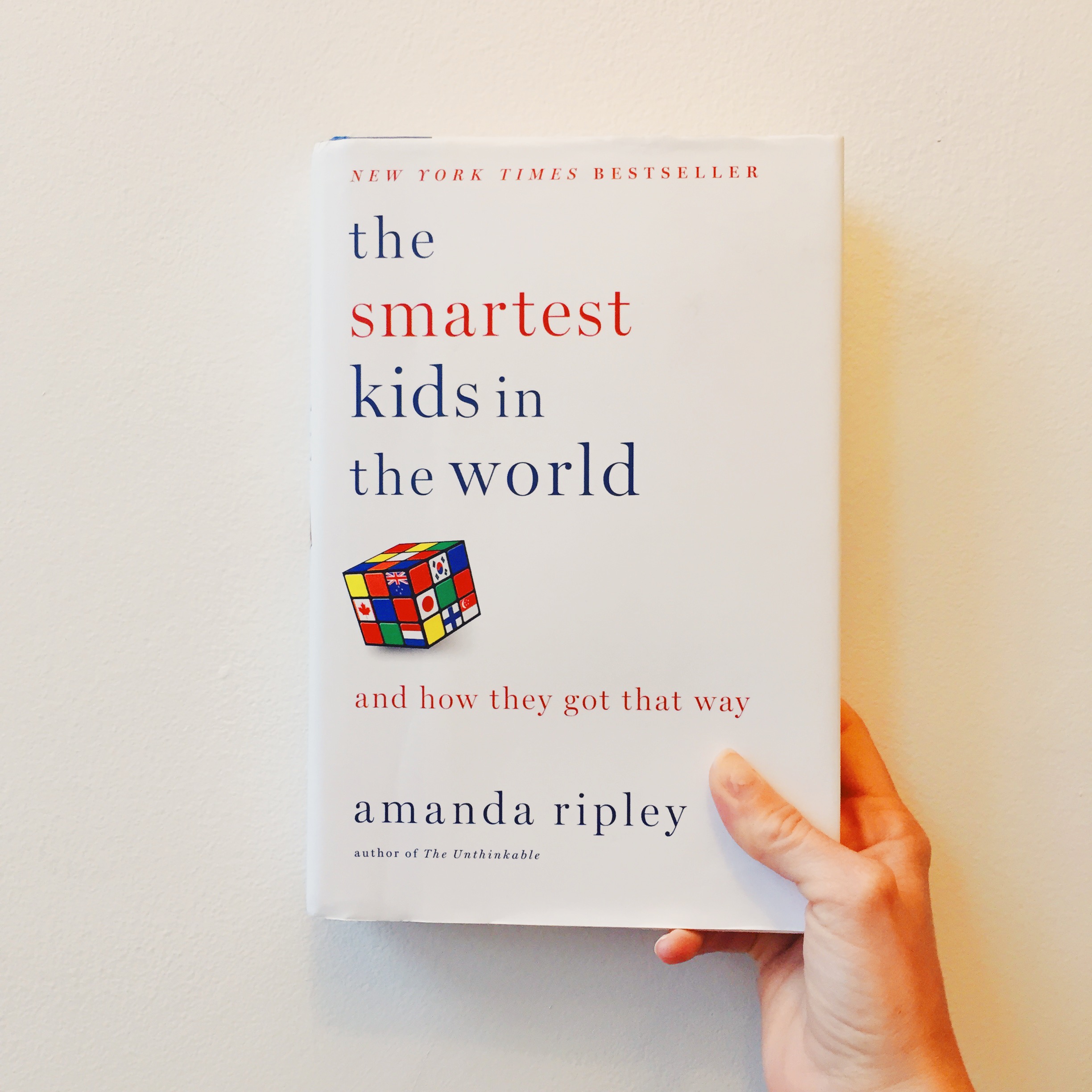review: the smartest kids in the world

My friend Ashley lent me The Smartest Kids in the World by Amanda Ripley before Christmas and I ate it up as we traveled. It compares education in South Korea, Finland, Poland, and the US by following exchange students from Oklahoma, Pennsylvania, and Minnesota. Along the way she discusses international testing, interviews teachers and students, and gives a sense of what it’s like to be a kid learning in each of these countries.
Before I read it, when I thought about education and my little family, I imagined us focusing on reading together and verbal comprehension stuff before formal schooling began. Reading together is probably one of the activities that comes to me the easiest in child-care. Joe has mentioned to me before that it might be nice if I started doing math with Lux, and perhaps science experiments, once in awhile. I told him I thought those things came in time. Maybe intuitively? Maybe when they were six? It was all vague and far away. Perhaps I wouldn’t even be the one to introduce them to math at all, I thought to myself. Suffice to say, it wasn’t on my priority list.
Now I know through Ripley’s book that this is a specifically American view: that one learns math through story problems and osmosis, certainly not through worksheets, repetition, or emphasis. I had heard rumors that the US tested miserably on most fronts in comparison to other developed nations. Now I recognize that in the context of math, we don’t seem to take it seriously, we don’t think it’s an applicable life skill, and we’d rather our kid took an easy test and did well than get a bad score and feel bad about themselves.
Which led me to wonder how I could help my kids be as good at math as they were at reading. How to be as casually conversant in equations as explaining a new vocabulary word. How to value rote memorization and convey its value. How to make numbers as familiar and intriguing as a new library book.
This is all on my mind right now because after Lux hit 3.5 years, she’s able to focus a bit more and has really got that sponge quality to her. I can actually imagine us sitting down to work on something for a bit, or learning and reviewing something over a couple of days. We’ve recently done a couple science experiments, things like vinegar + baking soda + balloon, and they were really fun.
Anyway, it’s a fascinating read and helped me correct my sights a bit on education. Since reading is a given for us, I’m going to be more aggressive with integrating math and science into our days. To start, I ordered this simple workbook to do with Lux for twenty minutes or so, when Joan is napping. I’m hoping it will help me familiarize myself how she approaches these things and give us a shared language.
16 Comments
Jana @ One Drawing a Day
Looks like a fascinating book!
Joan Mattelin
You might look into “math their way” it’s from the 70’s I think but it is very hands on, activity based and I think it’s pretty cool. You can find old books on eBay and amazon.
Rachael Ringenberg
Thank you! I definitely will.
Betsy
I’ve wanted to read this for awhile, I just bought it after your recommendation. I always hated math, I hope I can teach my children not to fear it as much as I did.
Rachael Ringenberg
I feel you!
Kate
Just a recommendation, look into the Japanese math and reading program called Kumon. There are Kumon workbooks available on amazon too. It’s a great enrichment program that shows great success!
Veronica
thanks for the tip 🙂
Rachael Ringenberg
Thank you! Love these ideas.
Veena
I just carried this book with me as I begin a new job with an education company in India, and I cannot wait to dive in. Your review has just moved it to the top of my pile! Thank you!
Rachael Ringenberg
Wow! How interesting. Well wishes!
bridget
I’m probably going to buy this book because you said so.
Rachael Ringenberg
It’s turning out to be a big hit around here.
Veronica
Good food for thought – thanks! I too, gravitate most easily to reading, but have also been having fun trying little experiments and making things like flubber and oobleck for my 2.5 yr daughter to explore. Math and numbers are another thing I want her to feel comfortable with and it’s good to think about how I might encourage that.
Rachael Ringenberg
Yes! I want to make those things. I think I’m like one ingredient away from having the right things.
MoiraRH
I’ve been reading this as well. So interesting (and not so surprising I suppose) how expectations and consensus by community regarding education impact learning and how kiddo internalize that. FYI my 5 year old like the Brain Quest Workbook series. We don’t use it consistently but whenever she sees it she asks to do it, which is awesome.
Rachael Ringenberg
Thanks! We are burning through this book much more quickly than I expected (she loves it) so I need another one to line up.